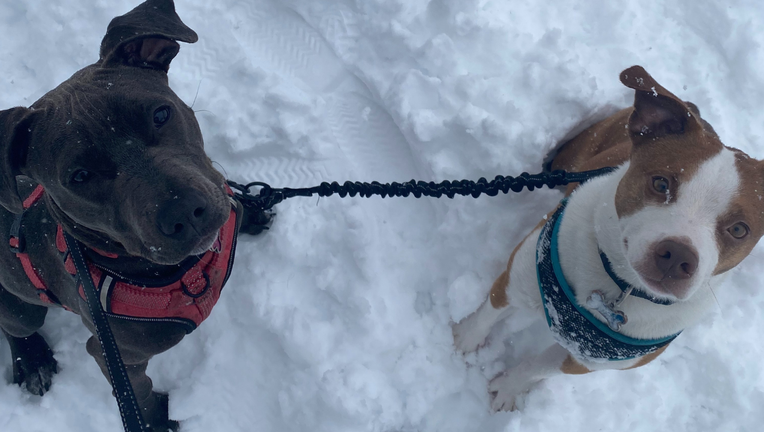Winter weather myths debunked to keep your pet safe

Winter weather can be beautiful to look at, and it certainly is fun to play in. Pet owners also know just how much fun their furry friends can have – especially in the snow.
But how do we keep them protected against the dangers that come with winter? And what are some of those myths that we're told that really aren't very true?
Here are some winter pet myths, debunked:
1. Dogs don't need a sweater
One of the biggest myths we often hear is dogs don't need sweaters because they have their own fur coats.
"I think that they need an extra layer when we need an extra layer," said Dr. Stephanie Liff, medical director at Pure Paws Vet Care of Clinton Hill. "So if we're in a sweater, that's probably equitable to their fur."
And if it's raining, dogs may want water barrier protection, like a raincoat. Or if it's cold and snowy, a sweater and jacket.
"So, it just depends on the weather and how cold it gets," Liff said.
2. Pets don't need flea, tick protection in the winter
And when it comes to flea and tick protection, this is a myth that many might have fallen for – thinking that in the winter you just don't need it, but that's not quite true.
"Heartworm disease exists in all 50 states now. We recommend year-round flea tick and heartworm prevention for all of our canine patients, and in most regions, feline patients as well," Liff said.
Veterinarians said they see a lot of tick activity in the fall and early spring.
"So if you stop your prevention when it snows, you could miss out on that early protection in the spring," Liff said.
3. Pets need less water in the winter
Dehydration is also something that we need to worry about year-round.
"When it's cold, it's usually very dry also, and so dehydration is actually an issue, even though we're not feeling sweaty," Liff said.
And pets have the same issues, so you need to make sure they have water to drink.
"If they don't like really cold water, you need to make sure we're accounting for that if the temperature is cold. But plenty of fresh water to drink for both our dogs and our cats," Liff said.
4. Dogs don't need drying after playing in snow
Another winter myth debunked: do you need to dry your dog off after a walk in the snow?
Liff said it's important to dry them off because their coat helps insulate them, and it will hold in the moisture a little, and then they can get a chill.
You will want to dry your pet off thoroughly, and don't forget to wipe their paws, making sure there's no salt or other debris on their feet because that can be really irritating to their skin, or if they lick it, to their tummy.
5. Heavy-coated dogs can live outside
Dog breeds like Huskies or Saint Bernards might seem like they can't get enough of the snow and don't want to come inside once they're out, but experts say every dog should have the option to come inside. No dog, even a thick-coated breed, is safe from frostbite or hypothermia. For dogs who spend a lot of time outdoors in the winter, make sure they always have fresh, unfrozen water for drinking. Talk with your vet about how long your individual dog can safely be left outside.
6. It's okay to leave your dog in your car because it's not hot out
Letting your dog sit in the car unattended in the winter isn't a good idea, experts say. You may think you'll be only a couple of minutes, but the risk isn't worth taking. Even if you keep the motor running, carbon monoxide poisoning becomes a concern if your dog is left in the car. If you're freezing when you first get in your car after leaving it sitting for a while, your dog will be, too.
7. Dogs don't need to exercise in the winter
While the humans might want to snuggle up and stay indoors when it's freezing, dogs have no such qualms. They still need to exercise in the winter months as much as they would in the spring or summer. If you aren't up for a trip to the dog park or a longer walk (or if your pet even wants to limit their time outdoors), consider playing tug-of-war or fetch inside. You can also use interactive food puzzle bowls or puzzle mats for mental stimulation.

